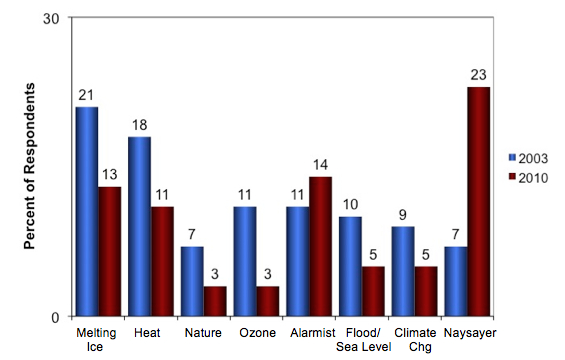Anthony Leiserowitz, director of the Yale Project on Climate Change Communication has new new paper, coauthored with Nicholas Smith, exploring affective reactions to global warming.
From the paper, “The Rise of Global Warming Skepticism: Exploring Affective Image Associations in the United States Over Time“:
[R]esearchers have focused on the role of “affect,” or the emotional quality of “good” or “bad” associated with different risks. This research has found that people draw upon both affect and other emotional cues to process information and make decisions about risk. Whereas the “risk as analysis” paradigm emphasizes the use of cognitive deliberation to assess risk, the “risk as feelings” approach argues that people are often more reliant upon affect and emotion when making risk judgments and decisions. Affect is processed quickly, automatically, and efficiently and enables people to make daily decisions with relatively little cognitive effort.
In an email, Leiserowitz writes:
In the past decade, the images and feelings Americans associate with the term “global warming” have shifted dramatically. …
In 2003, only 7% of Americans provided “naysayer” images (e.g., “hoax,” or “no such thing”) when asked what thought or image first came to mind when they heard the term “global warming.” By 2010, however, 23% of Americans provided “naysayer” images. …
The graph below summarizes how Americans’ associations to “global warming” changed from 2003 to 2010.

From the paper:
More specifically, the current investigation found that respondents who held an egalitarian worldview were more likely to perceive global warming as a serious threat whereas respondents who held an individualist view were more likely to perceive global warming as low risk. This finding also corroborates prior research that has used worldviews to predict global warming risk perceptions and policy preferences, among other issues.
I wrote about these two worldviews, as well as others, in an article on “Climate, Worldviews and Cultural Theory.”

